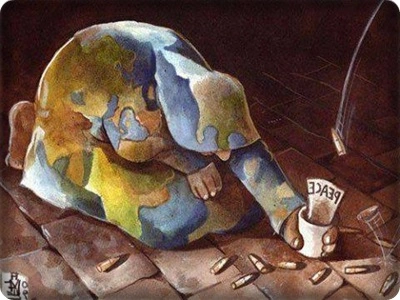The Importance of Peace in a Global Context
Peace is an essential element for the progress and well-being of humanity. In a world plagued by conflicts and wars, the pursuit of peace should be a top priority for nations and individuals alike. It is not merely the absence of war, but rather a state of tranquility, harmony, and cooperation among nations that allows for sustainable development and the fulfillment of human potential.
The consequences of war and conflict are devastating on multiple levels. Lives are lost, families are torn apart, and communities are destroyed. The physical and psychological scars of war persist long after the conflicts have ended. Resources that could have been used for education, healthcare, and infrastructure are instead diverted to warfare. It is clear that the cost of war far outweighs any potential benefits, making peace an imperative for the progress of humanity.
Characteristics of Effective Peace Leaders
Effective peace leaders possess a unique set of qualities that enable them to navigate the complex landscape of global politics and foster harmony among nations. Firstly, they possess strong communication skills, allowing them to effectively convey their message of peace and negotiate with conflicting parties. They are also empathetic and able to understand the perspectives and grievances of all parties involved, facilitating a more inclusive and balanced approach to conflict resolution.
Furthermore, effective peace leaders are visionary and have the ability to inspire others towards the pursuit of peace. They are committed to the principles of justice, equality, and human rights, and work tirelessly to promote these values in their interactions with other nations. Lastly, they possess resilience and perseverance, as the path to peace is often long and arduous. Despite setbacks and challenges, they remain steadfast in their commitment to finding peaceful solutions.
Strategies for Fostering Peace on a Global Scale
Promoting peace on a global scale requires a multifaceted approach that addresses the root causes of conflict and fosters a culture of understanding and cooperation. Education plays a crucial role in this process. By promoting peace education in schools and universities, we can equip future generations with the knowledge and skills necessary to resolve conflicts peacefully and build a more harmonious world. Peace education should encompass not only the history and consequences of war but also the principles of conflict resolution, empathy, and global citizenship.
Diplomacy and negotiations are another essential strategy for fostering peace. Through diplomatic channels, nations can engage in dialogue and find common ground to resolve their differences. This requires skilled diplomats who are adept at building relationships and finding win-win solutions. Diplomatic efforts should be accompanied by a commitment to international law and the establishment of institutions that promote peaceful dispute resolution.
The Role of Education in Promoting Peace
Education is a powerful tool for promoting peace and fostering global harmony. When individuals are educated about the consequences of war and conflict, they are more likely to value peace and seek nonviolent solutions to conflicts. Education can also promote understanding and empathy by exposing individuals to diverse perspectives and cultures. By teaching tolerance, respect, and appreciation for diversity, education can break down barriers and promote a sense of global citizenship.
In addition, schools and universities can play a crucial role in fostering peace by providing spaces for dialogue and conflict resolution. By incorporating peace education into the curriculum and creating opportunities for students to engage in meaningful discussions, educational institutions can empower young people to become agents of positive change. Through knowledge and dialogue, young minds can challenge stereotypes, question prejudices, and build bridges between communities.
Promoting Peace through Diplomacy and Negotiations
Diplomacy and negotiations are essential tools in the pursuit of peace. Diplomats act as mediators between conflicting parties, facilitating dialogue and finding common ground. Skilled diplomats possess the ability to listen, understand, and communicate effectively, bridging the gaps between different perspectives. Through diplomatic efforts, nations can resolve their differences peacefully and prevent conflicts from escalating into full-scale wars.
In addition to traditional diplomatic channels, multilateral organizations such as the United Nations play a crucial role in promoting peace. The United Nations serves as a forum for nations to come together, discuss global issues, and find collective solutions. Its various agencies and programs work towards conflict prevention, peacekeeping, and humanitarian assistance, providing a platform for nations to collaborate on peace initiatives.
The Power of Grassroots Movements in Achieving Peace
While diplomacy and international institutions are important, grassroots movements have proven to be powerful catalysts for change and peace. Grassroots movements are driven by individuals and communities who come together to address social and political issues at the local level. These movements have the advantage of being rooted in the experiences and needs of the people directly affected by conflict.
Grassroots movements can mobilize public opinion, advocate for peaceful solutions, and put pressure on governments to prioritize peace. They can raise awareness about the consequences of war and conflict, build networks of solidarity, and empower individuals to take action. Examples of successful grassroots movements include the anti-apartheid movement in South Africa and the civil rights movement in the United States. These movements demonstrate the transformative power of collective action in achieving peace and justice.
Examples of Successful Peace Initiatives Around the World
Throughout history, there have been numerous successful peace initiatives that have brought about positive change and transformed societies. One such example is the Good Friday Agreement, signed in 1998, which brought an end to decades of violence in Northern Ireland. The agreement established a power-sharing government and addressed the root causes of the conflict, paving the way for reconciliation and peace.
Another notable example is the peaceful transition to democracy in South Africa, led by Nelson Mandela. Through his leadership and commitment to nonviolence, Mandela was able to dismantle the apartheid regime and establish a democratic and inclusive society. The South African example shows that peace is not only the absence of war but also the presence of justice and equality.
The Challenges and Obstacles to Achieving Global Harmony
While the pursuit of peace is noble and necessary, it is not without its challenges and obstacles. One of the major obstacles is the persistence of deep-rooted conflicts and historical grievances. These conflicts are often driven by complex political, economic, and social factors that require long-term and sustained efforts to address. Additionally, vested interests and power dynamics can hinder progress towards peace, as conflicting parties may resist change or refuse to compromise.
Furthermore, the rise of extremism and radical ideologies poses a significant challenge to global harmony. Extremist groups, fueled by hatred and intolerance, seek to undermine peace and stability through acts of violence and terrorism. Countering extremism requires a comprehensive approach that addresses the root causes of radicalization, promotes inclusive societies, and provides opportunities for marginalized communities.
Conclusion: The Ongoing Pursuit of Peace and Its Significance for the World
In conclusion, peace is not a mere idealistic concept but a fundamental necessity for the progress and well-being of humanity. The consequences of war and conflict are devastating, and the cost of peace far outweighs any potential benefits. Strategies for fostering peace on a global scale include education, diplomacy, grassroots movements, and the promotion of justice and equality.
The role of effective peace leaders cannot be understated, as their vision, empathy, and perseverance are essential in navigating the complex landscape of global politics. Despite the challenges and obstacles, there have been successful peace initiatives throughout history, demonstrating that peace is attainable. However, the pursuit of peace is an ongoing process that requires collective action, commitment, and the recognition of our shared humanity. By unlocking the power of peace, we can create a world where harmony, cooperation, and sustainable development thrive.
CTA:
Join the movement for peace today. Together, we can make a difference in the world.



